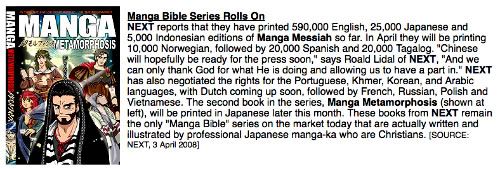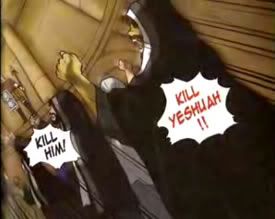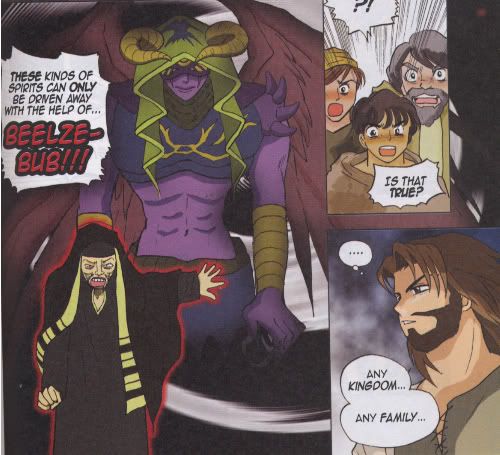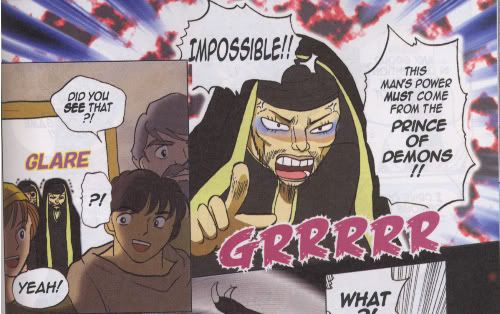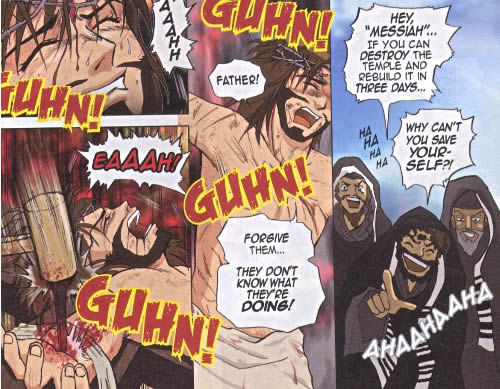|
Rick Warren Allies Mass Distribute Anti-Jewish Comic To School Kids
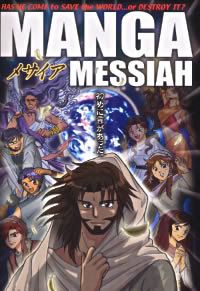 As I wrote late last May 2008 at the Huffington Post, "For several years now, I have been tracking and studying the covert aspects of Christian Zionism... [the publication of Manga Messiah] suggests the historically covert anti-Semitism within American Christian Zionist culture is mutating, changing and entering a new phase: the anti-Semitism is becoming overt." As I wrote late last May 2008 at the Huffington Post, "For several years now, I have been tracking and studying the covert aspects of Christian Zionism... [the publication of Manga Messiah] suggests the historically covert anti-Semitism within American Christian Zionist culture is mutating, changing and entering a new phase: the anti-Semitism is becoming overt." Typically, accusations concerning the distribution of anti-Semitic material and the spread of anti-Jewish attitudes have tended to focus on the propagation of such material and attitudes by Muslims. But Christianity arguably harbors a much older historic anti-Jewish animus than Islam and although the distribution of anti-Jewish material Christians has barely been assessed even in a cursory manner, preliminary indications suggest that Christian fundamentalist groups have for years been distributing literature with anti-Jewish content on a scale that in some cases, such as in Uganda, is both astonishing and horrific. From one perspective, Uganda is not a surprising country in which to find a concerted effort to spread anti-Jewish animosity. The former Ugandan dictator Idi Amin, a Muslim, successfully forced nearly the entire population of Jewish Ugandans out of the country, mainly to Israel. But the torrent of Manga Messiah comics flowing to the central African authoritarian nation is not an organic expression of upwelling anti-Jewish attitudes among common Ugandans; anti-Semitic attitudes are being incited by the Ugandan government and the Ugandan Anglican Church. Manga Messiah is being distributed through the official apparatus of the Ugandan state, which is slated to provide Uganda's school children with one million copies of the Manga comic, apparently as an adjunct of Uganda's literacy program. The ( Anglican ) Church of Uganda appears to be entering the anti-Semitic literature distribution business on an even larger scale, with NEXT, Inc., which distributes Manga Messiah, reporting that the Church of Uganda has requested ten million copies of the comic: enough to provide, along with the Ugandan state distribution to school children, to almost fifty percent of Uganda's entire population.
I initially wrote on "Manga Messiah" in May 2008, noting that the comic was been published for the American market by Tyndale House, an American fundamentalist publishing house that established its current prominence in large part due to the breakthrough success of Tim Lahaye's and Jerry Jenkins' Left Behind books. When I brought the comic to the attention of Political Research Associates' senior analyst Chip Berlet, Berlet categorized Manga Messiah as "[a] colorful comic training manual for motivating young leaders of the next pogrom against Jews. Not just offensive -- ghastly and horrific in content with a clear enemy scapegoat identified for venting apocalyptic religious bigotry." In researching Manga Messiah for my earlier story, I found little mention of the comic on the Internet. Now, less than a year later, Internet references to Manga Messiah seem to have proliferated almost exponentially. Chip Berlet is not alone in his assessment that Manga Messiah betrays an ugly anti-Jewish slant. As a story by journalist Tom Baker, published June 28, 2008 in central California's Modesto Bee, quoted Japanese popular culture scholar Prof. Deborah Shamoon of Notre Dame University, "I think the representation of Jews is appalling." The visual depiction of characters in Manga Messiah seems to fall into two basic categories. 'Sympathetic' characters, shown with traditionally tiny, triangular Manga-style noses and light complexion, and the Pharisees, shown with large hooked and bulbous noses and swarthy complexions, typically depicted as angry, vindictive or violent. In Manga Messiah, Jesus Christ is drawn in the 'sympathetic' style, thus giving readers of the comic the impression that he not related to the Pharisees or ethnically semitic.
That treatment of Jesus appears to fall within an anti-Semitic historical revisionist tendency which has attempted to rewrite Christianity, stripping away its Jewish origin and even claiming Jesus had an 'aryan" ethnic background. In The Aryan Jesus: Christian Theologians and The Bible in Nazi Germany, scholar Susannah Heschel examines the work of the "Institute For The Study and Eradication of Jewish Influence On German Church Life". Heschel describes, in the introduction to her book, that institute's work: The Institute's goals were both political and theological. Seeking to create a dejudaized church for a Germany that was in process of ridding Europe of all Jews, it developed a new biblical interpretation and liturgical materials. In the six years of its existence, as the Nazi regime carried out its genocide of the Jews, the Institute redefined Christianity as a Germanic religion whose founder, Jesus, has fought valiantly to destroy Judaism, falling victim to that struggle. Germans were now called on to be the victors in Jesus's own struggle against the Jews, who were said to be seeking Germany's destruction."
Manga Messiah both presents an ugly caricature of Jewish ethnicity and and depicts Jesus as non-semitic. But the comic also twists Biblical scripture in a highly deceptive manner which associates the Jewish Pharisees with the devil, represented in Manga Messiah by Beelzebub. The association of Jews with the devil, and the depiction of Jews as human-devil hybrids with demonic features such as horns, is one of the oldest and most enduring forms of anti-Jewish attacks. It may be the earliest of anti-Jewish memes and traces back to at least to the second century A.D., predating even one of the most outspoken early Christian purveyors of anti-Jewish invective, St. John Chrysostom. After the Holocaust, Christian theologians made a concerted effort to avoid the sort of Biblical exegesis that associated Jews with Satan. Part of the earlier approach was to conflate the Pharisees, who at the time were one particular religious tendency within Judaism, with Jews generally. Manga Messiah appears to be a reversion to that earlier, distorted presentation. According to analyst Chip Berlet, "Manga Messiah," currently sold at Barnes and Noble bookstores,
Portrays a version of reading Biblical text about the crucifixion of Christ rejected by most Christians for decades--especially since the Nazi genocide of Jews. In 1996, a press release from the Jewish Anti-Defamation League stated,
"After the Anti-Defamation League (ADL) raised concerns about what appeared to be horns on a porcelain figurine of Moses, the manufacturer apologized "for any misunderstanding" and told ADL it now has "a new Moses figurine" in the 1996 brochure. The League praised the Spanish company, LLADRO, for its prompt, responsive action." The ADL had complained about a 16 inch ceramic porcelain figurine of Moses that appeared to have horns. As the ADL explained,
"As you may know, for centuries the archetypal anti-Semitic image was that of a Jew depicted as a demonic creature complete with horns. Lladro's apparent portrayal of Moses perpetuates this pernicious image." In the New Testament Book of Matthew, 12:24, Matthew describes the Pharisees as accusing Jesus, who was healing people by casting out, exorcising that is, their demons, of performing this exorcisms with the aid of Beelzebub, commonly taken to represent Satan. But Manga Messiah's depiction presents to readers a wildly different pictorial narrative, by showing a glowering Pharisee, with a towering Beelzebub behind him as if a personal bodyguard, telling Jesus that he cannot possibly cast out demons without Beelzebub's aid. The difference is crucial. The visual import clearly tells readers the Pharisee is in league with the Beelzebub and it is reasonable also to infer from the presentation that the Pharisee himself relies on Beelzebub for help in casting out demons. As Tyndale House, producer of the Manga-style comic states, Manga Messiah,
Has become a huge hit with American teens and tweens. Manga has emerged as the most popular comics category and is one of the fastest growing genres in American publishing. Appealing to kids and adults, readers will find this edgy rendition of the Gospel accounts both compelling and highly engaging. This authentic, cutting-edge art style is combined with fast-paced storytelling to deliver biblical truths to an ever-changing culture that is often a challenge to penetrate. In terms of Manga Messiah's penetration of the American market, Tyndale's assessment is probably hyperbolic but an international effort has spring up to promote the anti-Jewish comic book. As described on a slick, flash driven website created by NEXT, Inc., 400,000 copies of Manga Messiah have been distributed free of charge to Ugandan school children, with another 400,000 in the pipeline. As NEXT, Inc. details the staggering scale of the anti-Jewish tract,
The first 400,000 copies of Manga Messiah have been printed for distribution to school children in Uganda free of charge. 800,000 books total will be delivered by the end of 2008. Books are a scarce commodity in Uganda, where 85% of the population earns less than $1/day and a Bible costs $8. The distribution of Manga Messiah, as described on the NEXT, Inc. site and also covered by Christian Comics International, seems to have the enthusiastic endorsement of top Ugandan government officials including Ugandan First Lady Janet Museveni:
On their trip to Uganda, NEXT representatives met with church and government officials including the Minister of Education, the Minister of Ethics and Integrity, and the First Lady. Everywhere, state officials celebrated the work the NEXT team had done on Manga Messiah and expressed excitement over the educational and spiritual value these books could bring to the youth of Uganda. As a story on Manga Messiah put out by the Queensland, Australia Queensland Uniting Church describes, in Manga Bible series goes global, the comic seems to have been first conceived of as an evangelizing tool for reaching Japanese citizens but was not well received in Japan:
Roald Lidal, general director of New Life League, a non-denominational publishing venture based in Kumai, Saitama, north of Tokyo, told Ecumenical News International, "It all started many years ago with a desire to reach out to Japanese."... New Life League, Japan, was founded in 1954 by the American missionary Fred Jarvis, as a "non-denominational literature ministry", near Tokyo, which focuses on the mass distribution of Bibles. According to Adventive Cross Cultural Initiatives, a ministry effort that grew out of New Life League, Japan (NLLJ), NLLJ produces "more than three hundred tons of Christian literature a month." So far, per NEXT, Inc.'s own reporting, by far the biggest source of sales of Manga Messiah has been through its partnership with the Church of Uganda which has requested in total a staggering 10 million copies of the 64 page comic book that Political Research Associate Senior Analyst Chip Berlet, considered a world authority on right wing ideology and conspiracy theory, has called a "training manual for the next pogrom against Jews." A Spanish version of Manga Messiah has been printed by the American Bible Society and many of the reported 50,000 copies of that version are being distributed, according to Christian Comics International, in Guatemala and Ecuador. Manga Messiah has received somewhat mixed reviews. As a one writer Manga Life concludes,
its audience will probably be limited to Christian teens who like seeing the Bible stories they hear in church illustrated in the style of popular manga (B+). Anyone else will probably not be too interested However, the Christian teen demographic that Manga Messiah might reach ranges in magnitude from between tens of millions upwards to hundreds of millions globally and although its likely that only a small fraction of that group will be exposed to Manga Messiah they will be exposed to one of the most enduring accusations in the cannon of anti-Jewish invective since the birth of Christianity: the claim that Jews are plotting, in league with the devil, to destroy the Christian faith. (see image below)
The distribution of Manga Messiah in Uganda is an especially notable attempt to flood a country with anti-Semitic literature but by some reports Manga Messiah has also been distributed in mass quantity in Guatemala and the Philippines.
Rick Warren Allies Mass Distribute Anti-Jewish Comic To School Kids | 27 comments (27 topical, 0 hidden)
Rick Warren Allies Mass Distribute Anti-Jewish Comic To School Kids | 27 comments (27 topical, 0 hidden)
|
||||||||||||
| ||||||||||||




 print page
print page
 Following a March 2008 meeting with Janet Museveni, Rick Warren announced his plan to make Uganda the world's 2nd "Purpose Driven" nation and enthused, to an audience at Uganda's elite Makerere University, "The future of Christianity is not Europe or North America, but Africa, Asia and Latin America." Warren's declaration was followed up by Uganda's Archbishop, Henry Orombi, under whose aegis the Church of Uganda intends to distribute ten million anti-Jewish comic books; "Someday we will have a purpose driven continent!"
Following a March 2008 meeting with Janet Museveni, Rick Warren announced his plan to make Uganda the world's 2nd "Purpose Driven" nation and enthused, to an audience at Uganda's elite Makerere University, "The future of Christianity is not Europe or North America, but Africa, Asia and Latin America." Warren's declaration was followed up by Uganda's Archbishop, Henry Orombi, under whose aegis the Church of Uganda intends to distribute ten million anti-Jewish comic books; "Someday we will have a purpose driven continent!" 